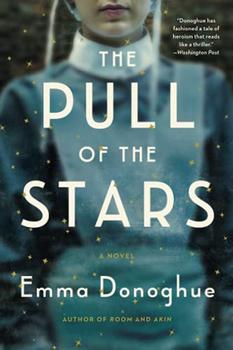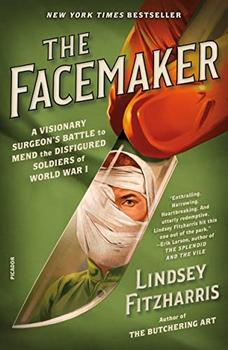Summary | Excerpt | Reviews | Beyond the book | Read-Alikes | Genres & Themes | Author Bio

Julia Power is a skilled nurse working in a dangerously understaffed hospital in Ireland's capital. With the population already decimated by war, the arrival of a deadly flu pandemic is the last thing the hospital is equipped to deal with, but on a tiny improvised ward for heavily pregnant women who have contracted the virus, Julia continues to serve with compassion. Throughout the three intense days depicted in the novel, she is aided by Kathleen Lynn, a political radical and pioneering female doctor, and Bridie Sweeney, a novice volunteer with a tragic past and a big heart. The contrasting trauma and beauty of what they experience together will teach them as much about themselves as each other; their unwavering dedication a testament to the endurance of hope even in the darkest of times.
Donoghue succeeds in capturing the abject horror of a city blighted by the cumulative effects of war and disease. Though she never shies away from detailing the utter devastation racking people's bodies (indeed, there are several deeply upsetting and visceral sequences), there's a tenderness to Julia's perspective that grounds the narrative and stops it from tipping into gratuitous suffering. As well as being set against the backdrop of actual historic events, the inclusion of real-life doctor and rebel Kathleen Lynn further emphasizes the story's factual basis. Couple this with the author's sensitive handling of difficult subject matter and every instance of heartbreak feels earned.
The decision to focus on a restricted timeframe of just three days allows Donoghue to show how relentless a nurse's work really was during this time. Distressing scenes are presented in excruciating detail, drawn out to an almost painful extent, but this makes the vital tension-breaking moments of friendship, love and light all the more poignant and impactful.
Due to the intensity with which it attacked the immune system, the strain of flu spreading in 1918 was known to hit pregnant women particularly hard — their bodies already operating in overdrive. This often led to deadly complications for both mother and child. As such, parallels are drawn throughout the novel between the experiences playing out on Julia's ward and the brutality of the battles unfolding on mainland Europe. If men were suffering on the frontline in the name of freedom, women in maternity wards were paying an equal debt in blood, pain and misery to keep the spark of human hope alive.
Aside from the historical significance of being set at the crossroads between the war and the flu pandemic, the novel captures Ireland during a period of great transition socially. Women have just won the right to vote in elections for the first time and hospitals are finally employing female doctors. And yet, tensions remain: nurses are still denied decision-making power, their medical expertise underestimated; Catholics and Protestants are still at loggerheads; controversial mother-and-baby homes continue to exploit society's most vulnerable by separating unmarried women from their children; soldiers are returning from the trenches with PTSD; and the fight for political independence from the UK leads to violent protests and bitter division. All of these notions are woven into the narrative in a seamless way that grants them equal room to breathe. The novel serves as a fascinating window into Irish society at the time and reflects the idea that life endures in all its nuance and complexity no matter the obstacles faced by the wider world.
The Pull of the Stars takes us from despair right through to euphoria and back again, but the presiding tone throughout is always fiercely feminine. Beyond the gripping narrative and its endearing characters, the book serves as a love letter to all the women who sacrifice themselves mind, body and soul in the name of caring for others — a theme that resonates as powerfully today as it ever did.
![]() This review was originally published in The BookBrowse Review in August 2020, and has been updated for the
October 2021 edition.
Click here to go to this issue.
This review was originally published in The BookBrowse Review in August 2020, and has been updated for the
October 2021 edition.
Click here to go to this issue.

If you liked The Pull of the Stars, try these:

by Ritu Mukerji
Published 2024
For fans of Jacqueline Winspear and Charles Todd, Murder by Degrees is a historical mystery set in 19th century Philadelphia, following a pioneering woman doctor as she investigates the disappearance of a young patient who is presumed dead.

by Lindsey Fitzharris
Published 2023
Lindsey Fitzharris, the award-winning author of The Butchering Art, presents the compelling, true story of a visionary surgeon who rebuilt the faces of the First World War's injured heroes, and in the process ushered in the modern era of plastic surgery.
Your guide toexceptional books
BookBrowse seeks out and recommends the best in contemporary fiction and nonfiction—books that not only engage and entertain but also deepen our understanding of ourselves and the world around us.